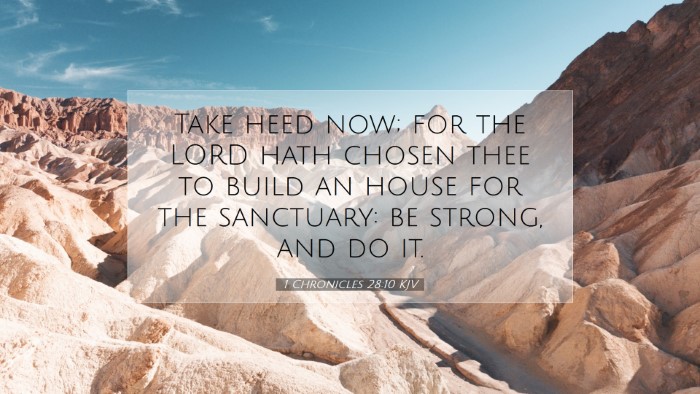Bible Commentary on 1 Chronicles 28:10
Verse: "Take heed now; for the LORD hath chosen thee to build an house for the sanctuary: be strong, and do it."
Introduction
This verse captures a significant moment in the history of Israel, as King David, in his old age, acknowledges the divine appointment of his son Solomon to undertake the monumental task of building the Temple in Jerusalem.
It stands as an encouragement not only for Solomon but also resonates through the ages to all called to carry out God's work, emphasizing themes of divine selection, strength, and obedience.
Divine Choice
1. The Selection of Solomon
According to Matthew Henry, the phrase "the LORD hath chosen thee" emphasizes that God’s call is central to the task at hand.
David reiterates that it wasn’t merely a royal edict but a divine commission. Solomon's selection reflects God's sovereignty and purpose in guiding His people through chosen leaders.
Albert Barnes adds that God’s choosing is not just for the glory of Solomon or David, but for the greater purpose of establishing a sanctuary where the presence of God could dwell among His people.
This highlights the significance of the Temple as a central aspect of Israel’s identity and worship.
Preparation and Responsibility
2. The Call to Take Heed
The exhortation "Take heed now" signifies the need for vigilance and attentiveness in fulfilling God’s command.
Adam Clarke emphasizes the seriousness of this divine task, suggesting that Solomon must approach it with the utmost reverence and dedication.
Christian leaders and pastors can glean from this call to be diligent in their God-given roles, ensuring they are grounded in prayer and Scripture as they lead their congregations.
Strength in Service
3. Be Strong, and Do It
The command "be strong, and do it" serves as a powerful affirmation of courage and action.
As Matthew Henry notes, the task ahead of Solomon was monumental and fraught with challenges, but the source of his strength would be rooted in God’s assurance.
Strength in ministry is not a matter of personal fortitude but rather reliance on divine support and wisdom. This crucial exhortation serves as a timeless reminder that one must act with faith and determination.
Theological Implications
4. The Temple as a Symbol
The Temple, as outlined in this context, is emblematic of God's desire to dwell among His people. Albert Barnes reflects on the theological importance of the Temple, signifying God's presence and the restoration of the divine-human relationship.
For today’s believers, the Temple foreshadows the ultimate fulfillment seen in Jesus Christ, who embodies the presence of God among humanity (John 1:14).
This understanding deepens our appreciation for the indwelling presence of the Holy Spirit in the life of every believer.
Conclusion
In summation, 1 Chronicles 28:10 serves as a profound reminder of God’s choosing, the required diligence to fulfill His call, and the strength necessary to perform the seemingly impossible tasks he sets before us.
Adam Clarke concludes by emphasizing that God equips those He calls; thus, understanding our divine assignments can radically transform how we approach our ministries and personal callings.
As pastors, students, theologians, and scholars, let us foster a recognition of our responsibilities as divinely chosen servants, rooted in strength that comes only from our relationship with God.


